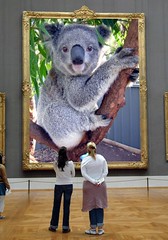We had a kookaburra visit us on our balcony at home the other week. We got some of our cat's raw mince from the fridge and lined up a few globs of it along the ledge. With us kept at a careful distance, the kookaburra then swooped in and collected the meat with a surgical snap of its beak, pausing to smack the bloody lump on the side of the ledge before swallowing, no doubt to replicate the motion of a kill. This process continued for a time: human leaves glob; bird flies in, eats glob and departs; repeat.
I have mixed feelings about all of this, especially as it relates to koalas: on the one hand, there's humbling delight in having a wild animal let you to engage with it. On the other hand, I feel a creeping sense of angst about encouraging such dependence. They (animals) depend on us, we don't depend on them. In the case of koalas, we're trying to undo or ameliorate the damage we've caused by relentless human expansion into native habitats.
I remember watching the TV series, Animal Contract, based on the book by Desmond Morris (1989). Being a vegetarian at the time, I was enthralled by Morris's controversial argument that vegetarians actually did animals no favours; instead, what ensured animals' survival was the "contract" set up between humans and animals. We need them for food and other necessities which fuels our concern with their long-term cultivation and survival.
This is true of livestock (which are valued for their provision of food and other goods), and dogs and cats and budgies (which are valued as "companion animals"). But what of animals that serve no such utilitarian function, where the animal's function to us is merely an aesthetic one? ie, it gives me a warm fuzzy feeling that there are meerkats in the world, but they're not required for my existence. This makes them a nice-to-have, not a must-have.
What is the consequence of animals whose survival is not protected under the animal contract? I suppose they become "vulnerable", which is status the koala population has been assigned. And then possibly they become extinct. Sorry to have turned so morosely philosophical all of a sudden; I've been more than a little affected by the recent assertion in the Sydney Morning Herald that koalas could be extinct in as little as seven years. I can't imagine only ever seeing koalas in pictures.

No comments:
Post a Comment